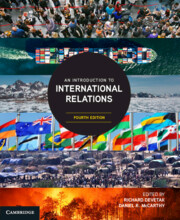Book contents
- Frontmatter
- Contents
- Tables, figures and boxes
- Contributors
- Preface and acknowledgements
- Guide to online instructor resources
- Introduction: The origins and changing agendas of international relations
- Part 1 Theories of International Relations
- Chapter 1 International Relations theory in an age of critical diversity
- Chapter 2 Liberalism
- Chapter 3 Realism
- Chapter 4 Marxism and critical theory
- Chapter 5 Feminism
- Chapter 6 Postmodernism
- Chapter 7 Constructivism
- Chapter 8 Postcolonialism
- Part 2 International history
- Part 3 The traditional agenda: States, wars and law
- Part 4 The new agenda: Globalisation and global challenges
- References
- Index
- Figure and text acknowledgements
Chapter 5 - Feminism
from Part 1 - Theories of International Relations
Published online by Cambridge University Press: 31 August 2024
- Frontmatter
- Contents
- Tables, figures and boxes
- Contributors
- Preface and acknowledgements
- Guide to online instructor resources
- Introduction: The origins and changing agendas of international relations
- Part 1 Theories of International Relations
- Chapter 1 International Relations theory in an age of critical diversity
- Chapter 2 Liberalism
- Chapter 3 Realism
- Chapter 4 Marxism and critical theory
- Chapter 5 Feminism
- Chapter 6 Postmodernism
- Chapter 7 Constructivism
- Chapter 8 Postcolonialism
- Part 2 International history
- Part 3 The traditional agenda: States, wars and law
- Part 4 The new agenda: Globalisation and global challenges
- References
- Index
- Figure and text acknowledgements
Summary
This chapter examines several feminist approaches to the study and practice of international relations. It highlights the similarities between these approaches, but also the differences. It does this first by tracing the interventions made by feminists into international relations and the creation of a distinctly feminist IR agenda. Second, it uses the ‘gender lens’ to demonstrate and analyse how experiences and understandings in international relations can be ‘gendered’. Finally, it explains and examines the critiques made by the different feminist approaches to international relations.
Keywords
- Type
- Chapter
- Information
- An Introduction to International Relations , pp. 70 - 82Publisher: Cambridge University PressPrint publication year: 2024

